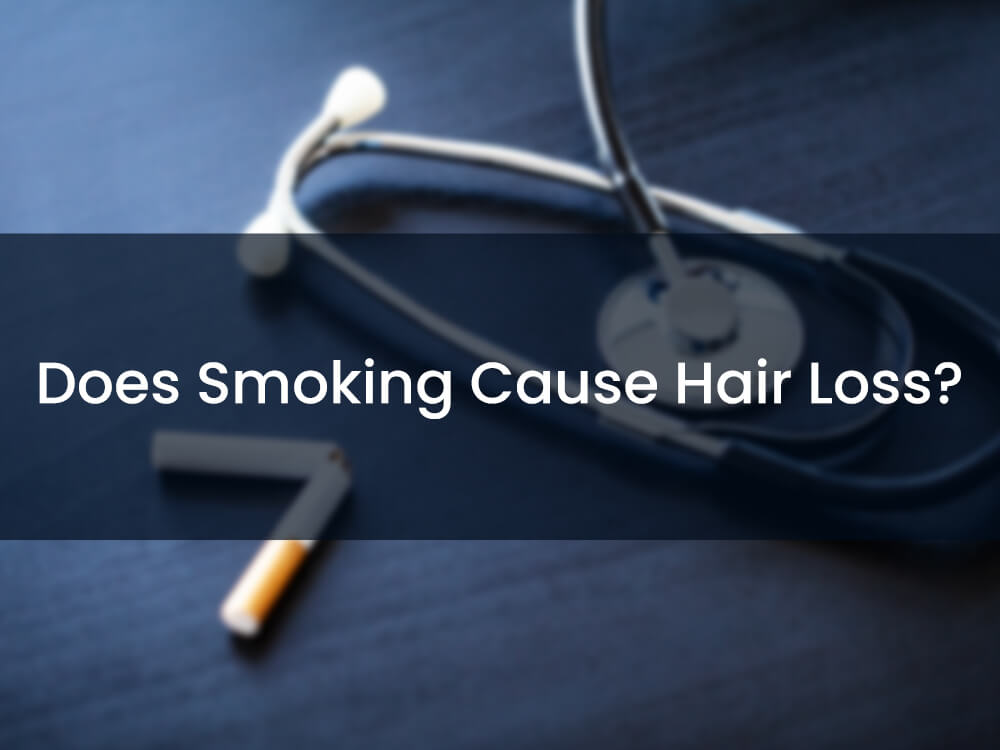
Smoking has long been associated with numerous health risks, from respiratory problems to heart disease. But did you know that smoking can also contribute to hair loss? Understanding the impact of smoking on the body and its connection to hair health is crucial in order to make informed choices about our habits and overall well-being.
Understanding the Impact of Smoking on the Body
Before delving into the relationship between smoking and hair loss, it is essential to comprehend the ways in which smoking affects the body as a whole. Cigarette smoke is a complex mixture of chemicals, consisting of more than 7,000 compounds, many of which are harmful to the body.
The Composition of Cigarette Smoke
When tobacco burns, it releases a blend of toxic substances, including carbon monoxide, formaldehyde, and ammonia. These chemicals can cause damage to various organs and tissues throughout the body, including the hair follicles.
How Smoking Affects Circulation
Smoking has a detrimental effect on circulation by narrowing the blood vessels and reducing blood flow. This restricted blood flow not only impacts organs and tissues but can also compromise the health of the hair follicles, leading to hair loss.
Moreover, smoking is known to accelerate the aging process of the skin, leading to premature wrinkles and a dull complexion. The harmful chemicals in cigarette smoke break down collagen and elastin, which are essential proteins for maintaining skin elasticity and firmness.
Impact on Respiratory System
Aside from affecting circulation and skin health, smoking also significantly impacts the respiratory system. The inhalation of smoke damages the cilia in the respiratory tract, leading to a buildup of mucus and a decreased ability to clear out toxins and pathogens. This damage can result in chronic coughing, increased risk of respiratory infections, and long-term conditions such as chronic obstructive pulmonary disease (COPD).
The Connection Between Smoking and Hair Health
While the specific mechanisms through which smoking contributes to hair loss are not yet fully understood, scientific studies have shed light on potential ways in which smoking affects hair health.
It is important to note that smoking not only impacts hair health but also has broader implications for overall well-being. The detrimental effects of smoking on the cardiovascular system can indirectly affect hair health as well. The constriction of blood vessels caused by smoking can reduce blood flow not only to the heart and lungs but also to the scalp, further compromising the nourishment available to the hair follicles.
The Role of Blood Flow in Hair Growth
Healthy blood flow is vital for optimal hair growth. The hair follicles require a steady supply of oxygen and nutrients carried by the blood in order to function properly. Smoking compromises this blood flow, depriving the follicles of essential nourishment.
In addition to impeding blood flow, smoking can also disrupt hormonal balance in the body. Hormones play a crucial role in regulating hair growth cycles. The alterations in hormone levels caused by smoking can disrupt this delicate balance, leading to issues such as premature hair thinning and loss.
Smoking and Hair Follicle Damage
Research suggests that smoking may damage the DNA in hair follicles, leading to their dysfunction. This can result in weaker, thinner, and more brittle hair, ultimately contributing to hair loss. The harmful chemicals present in cigarette smoke can induce oxidative stress and inflammation, which further exacerbate hair follicle damage.
Furthermore, smoking has been linked to an increase in the production of free radicals in the body. These unstable molecules can cause damage to cells, including those in the scalp and hair follicles. The resulting oxidative stress not only impairs hair growth but can also accelerate the aging process, leading to premature graying and overall hair quality deterioration.
Scientific Studies on Smoking and Hair Loss
Several scientific studies have investigated the relationship between smoking and hair loss to provide evidence-based insights into this topic.
Understanding the impact of smoking on hair health is crucial, as smoking is known to have detrimental effects on various bodily functions. Hair loss, a common concern for many individuals, can be influenced by a multitude of factors, including genetics, lifestyle choices, and environmental exposures.
Key Findings from Research
A study published in the Journal of the American Academy of Dermatology found that smoking is associated with increased severity of hair loss in individuals with androgenetic alopecia, a common hereditary form of hair loss. Another study in the Archives of Dermatology revealed that smoking is a risk factor for early-onset hair graying, which can precede hair loss.
These findings underscore the importance of considering smoking cessation as a potential intervention to mitigate the risk of hair loss and premature graying. The detrimental effects of smoking on hair follicles and pigmentation highlight the need for further exploration into the underlying mechanisms.
Limitations of Current Studies
While these studies provide valuable insights, it’s important to note that they primarily establish correlations between smoking and hair loss. Further research is needed to determine the precise mechanisms, causality, and potential reversibility of smoking-induced hair loss.
Exploring the interplay between smoking, oxidative stress, hormonal imbalances, and inflammatory responses within the scalp could offer a more comprehensive understanding of how smoking contributes to hair loss. Longitudinal studies tracking the progression of hair loss in smokers and non-smokers over time may elucidate the long-term effects of smoking on hair health.
Other Lifestyle Factors Contributing to Hair Loss
Aside from smoking, several other lifestyle factors can contribute to hair loss. Understanding these factors can inform holistic strategies for maintaining healthy hair.
One often overlooked lifestyle factor that can impact hair loss is exposure to environmental pollutants. Pollutants in the air and water, such as heavy metals and chemicals, can accumulate in the body over time and contribute to hair thinning and loss. Incorporating regular detoxification practices, such as drinking plenty of water and consuming foods rich in antioxidants, can help reduce the impact of environmental pollutants on hair health.
Diet and Hair Loss
Unhealthy eating habits, particularly a lack of essential nutrients like vitamins and minerals, can impact hair health. A balanced diet containing sufficient amounts of protein, vitamins, and minerals is crucial for maintaining strong and vibrant hair.
In addition to nutrient deficiencies, excessive consumption of certain foods can also play a role in hair loss. High intake of sugary, processed foods can lead to inflammation in the body, including the scalp, which can hinder hair growth. Opting for a diet rich in whole foods, such as fruits, vegetables, and lean proteins, can promote healthier hair growth and overall well-being.
Stress and Hair Health
Chronic stress can have a detrimental effect on overall health, including hair health. It can disrupt the hair growth cycle, leading to a condition known as telogen effluvium, where the hair prematurely enters a resting phase, resulting in excessive shedding.
Moreover, stress can also impact hormone levels in the body, specifically increasing the production of cortisol, known as the stress hormone. Elevated cortisol levels can disrupt the normal functioning of hair follicles, leading to hair thinning and loss. Incorporating stress-reducing practices such as meditation, yoga, or regular exercise can help mitigate the effects of stress on hair health.
Steps to Mitigate Hair Loss from Smoking
If you are concerned about the potential hair loss associated with smoking, there are steps you can take to mitigate its effects.
Smoking is known to have detrimental effects on hair health, as it restricts blood flow to the hair follicles, leading to weakened hair growth and potential hair loss. In addition to impacting hair health, smoking can also cause premature graying and dullness in hair texture.
Quitting Smoking for Hair Health
The most effective way to reduce the risk of smoking-induced hair loss is to quit smoking altogether. By quitting, you not only improve your overall health but also increase blood circulation, giving your hair follicles a chance to recover and thrive.
Quitting smoking can be a challenging journey, but the benefits for your hair and overall well-being are significant. As your body detoxifies from the harmful chemicals in cigarettes, you may start to notice improvements in your hair quality, such as increased shine and strength.
Treatments for Hair Loss Due to Smoking
Various treatments are available for hair loss, ranging from topical solutions to oral medications and hair transplant surgeries. Consulting with a dermatologist or hair specialist can help determine the most suitable treatment option based on individual circumstances.
It’s important to address the root cause of hair loss, which in the case of smoking, involves not just treating the external symptoms but also focusing on internal health. Nutrient-rich diets, scalp massages, and stress-reducing activities can complement hair loss treatments and promote healthier hair growth.
While smoking itself does not guarantee hair loss, the evidence suggests a clear association between smoking and hair health. Taking steps to quit smoking and adopting a healthy lifestyle can go a long way in maintaining healthy hair and overall well-being. Your hair deserves the best care, so why not make a positive change for both your health and your hair?



